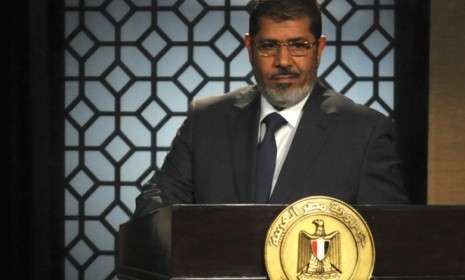Has the U.S. lost Egypt?
Egypt has long been Washington's key Arab ally. But now the country has an Islamist president — and he's hardly America's No. 1 fan

A free daily email with the biggest news stories of the day – and the best features from TheWeek.com
You are now subscribed
Your newsletter sign-up was successful
The revolutionary changes that have transformed Egypt in the last year have upended Washington's relationship with one of its crucial Arab allies. Hosni Mubarak, the America-friendly strongman who led Egypt for decades, has been replaced by Mohamed Morsi, an Islamist leader from the once-outlawed Muslim Brotherhood who shares few U.S. goals, and vows to reexamine his country's 30-year peace with Israel. President Obama is reaching out to Morsi, calling his election a milestone on the road to democracy. But has the Arab Spring transformed America's longtime ally into an enemy?
An old friend has become a new enemy: "Egypt is lost," says Bret Stephens at The Wall Street Journal. The Muslim Brotherhood won't "play by the democratic rules that brought it to power" or remain a responsible player on the international scene. You can bet that Morsi and Co. will "arm Hamas and remilitarize the Sinai," striking "radical alliances in the Middle East" and thwarting U.S. policy at every turn. Prepare for an Islamist Egypt that despises us as much as Iran does. We're in for a "long and ugly haul."
The Week
Escape your echo chamber. Get the facts behind the news, plus analysis from multiple perspectives.

Sign up for The Week's Free Newsletters
From our morning news briefing to a weekly Good News Newsletter, get the best of The Week delivered directly to your inbox.
From our morning news briefing to a weekly Good News Newsletter, get the best of The Week delivered directly to your inbox.
All is not lost... but there is much uncertainty ahead: It's too early to say what the rise of the Muslim Brotherhood means for the U.S., says Peter Brookes at the Boston Herald. The military, which has run Egypt for six decades, is unlikely to give Morsi carte blanche. That means Egyptians will probably fight over everything from the future of secularism to the Camp David Accords to ties with Iran. But here's what is clear: In the new Egypt, America has "diminished clout" that will lead to our "increasingly shrinking visibility and sway in the region."
"Egypt's future still uncertain"
Hold on. Let's be optimistic: "Egypt isn't lost," says Marc Lynch at Foreign Policy. "On the contrary, it has just very, very narrowly avoided complete disaster," which is what we would have faced had the military rigged the presidential election and crowned its ally, former Mubarak prime minister Ahmed Shafiq, instead of Morsi. The Brotherhood isn't dominant — it barely beat a "figurehead of the old regime." There's an "intense political struggle to come" — but at least now the West can engage with a government instead of a country in chaos.
A free daily email with the biggest news stories of the day – and the best features from TheWeek.com
-
 Health insurance: Premiums soar as ACA subsidies end
Health insurance: Premiums soar as ACA subsidies endFeature 1.4 million people have dropped coverage
-
 Anthropic: AI triggers the ‘SaaSpocalypse’
Anthropic: AI triggers the ‘SaaSpocalypse’Feature A grim reaper for software services?
-
 NIH director Bhattacharya tapped as acting CDC head
NIH director Bhattacharya tapped as acting CDC headSpeed Read Jay Bhattacharya, a critic of the CDC’s Covid-19 response, will now lead the Centers for Disease Control and Prevention
-
 The billionaires’ wealth tax: a catastrophe for California?
The billionaires’ wealth tax: a catastrophe for California?Talking Point Peter Thiel and Larry Page preparing to change state residency
-
 Bari Weiss’ ‘60 Minutes’ scandal is about more than one report
Bari Weiss’ ‘60 Minutes’ scandal is about more than one reportIN THE SPOTLIGHT By blocking an approved segment on a controversial prison holding US deportees in El Salvador, the editor-in-chief of CBS News has become the main story
-
 Has Zohran Mamdani shown the Democrats how to win again?
Has Zohran Mamdani shown the Democrats how to win again?Today’s Big Question New York City mayoral election touted as victory for left-wing populists but moderate centrist wins elsewhere present more complex path for Democratic Party
-
 Millions turn out for anti-Trump ‘No Kings’ rallies
Millions turn out for anti-Trump ‘No Kings’ ralliesSpeed Read An estimated 7 million people participated, 2 million more than at the first ‘No Kings’ protest in June
-
 Ghislaine Maxwell: angling for a Trump pardon
Ghislaine Maxwell: angling for a Trump pardonTalking Point Convicted sex trafficker's testimony could shed new light on president's links to Jeffrey Epstein
-
 The last words and final moments of 40 presidents
The last words and final moments of 40 presidentsThe Explainer Some are eloquent quotes worthy of the holders of the highest office in the nation, and others... aren't
-
 The JFK files: the truth at last?
The JFK files: the truth at last?In The Spotlight More than 64,000 previously classified documents relating the 1963 assassination of John F. Kennedy have been released by the Trump administration
-
 'Seriously, not literally': how should the world take Donald Trump?
'Seriously, not literally': how should the world take Donald Trump?Today's big question White House rhetoric and reality look likely to become increasingly blurred